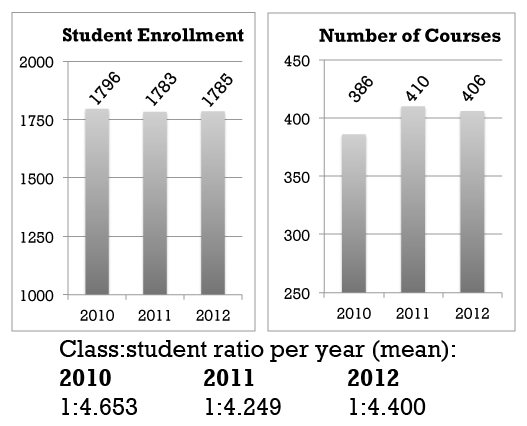

As students begin to settle into the spring semester at the College, many have had a more difficult and stressful time with their academics than usual. Spiteful professors and piles of reading, however, are not the culprit. Rather, more students have been “dropped,” or kicked out of their classes, this semester than in the past, forcing them to hectically patch together a new schedule during the 10-day add/drop period.
“I avoided classes with enrollment caps, because I didn’t think I had a chance of getting into them, and I wanted to avoid the last minute add/drop rush. I’ve also started looking into taking courses in the other four colleges,” Varsha Singh ’14 said.
Several factors, from retiring professors to a growing student body, have led to filled classes, leaving many students with unsatisfactory class options. In one case, 50 students who wanted to take Introduction to Psychology were dropped from the class before the semester began because it was over enrolled.
While the problem seems simple — too few spots for too many students — Dean of the Faculty Gregory Call and the professors and students who serve on the Committee on Educational Policy (CEP) assert that over enrollment is a much more complicated issue than it appears. As Dean Call points out, there are only three more students on campus this spring semester than last spring semester and four fewer courses being offered. Clearly, something more complicated than blindly hiring more professors is necessary to solve the problem.
Appointed to advise Dean Call on the hiring of new faculty and other ways in which to improve the quality of an Amherst education, the CEP has had to deal with over enrollment “… in different forms in different years,” according to committee Chairman and Professor of Computer Science Lyle McGeoch.
Professor Rick Lopez, an Amherst alumnus and faculty member currently serving on the CEP, feels that quick fixes will be hard to come by in this year’s fight against over enrollment.
“The scheduling problem is a nightmare,” Lopez said.
However, the committee has struggled to find new ways to reduce conflicts. Last year, for instance, one of the CEP’s biggest initiatives was to vary class start times, a change which will be implemented in the fall of 2012, but they were hesitant to make drastic changes, like scheduling evening classes.
Although many members of the CEP would rather hire more professors to fill curricular demands, that approach has been surprisingly ineffective.
“We’re hiring at break-neck speed as it is,” said Matt DeButts ’14, a student member of the CEP. DeButts stated that, though he would rather hire more faculty at a faster rate, he is also unsure whether that tactic would help decrease the number of students dropped from their courses.
“Its pretty hard to interpret the data because there are so many different issues going on,” McGeoch said.
Why students are having more trouble this semester than in years past, despite the similar class offerings, is a difficult question that CEP members are trying to answer.
“There are various ways to try to define the problem,” said CEP member Professor Anthony Bishop.
Since these definitions range from faculty retirement to the relatively large sophomore class, there is no clear way of pinning down the central causes of over enrollment.
“I’m concerned about the reports I’ve heard from students and faculty about the challenges students faced this spring in finalizing their schedules,” Dean Call said. “I’m committed to working with the Registrar and the CEP to determine what transpired and how we can improve the situation in the future.”
Although some frustrated students have called for drastic changes in the way the class registration system works, the CEP and Dean Call do not see any fundamental problems in the system.
“There have been rumblings about changing things more radically, but I think that the current committee likes the basic structure of pre-registration and add/drop,” Bishop said.
Despite the recent problems, students still have the luxuries of shopping multiple classes and studying in an open curriculum, an option that is available at few other schools in the country.
“[We, the CEP,] will need to think creatively about how to deal with the recent clustering by students within a relatively small number of courses and majors,” Lopez said.